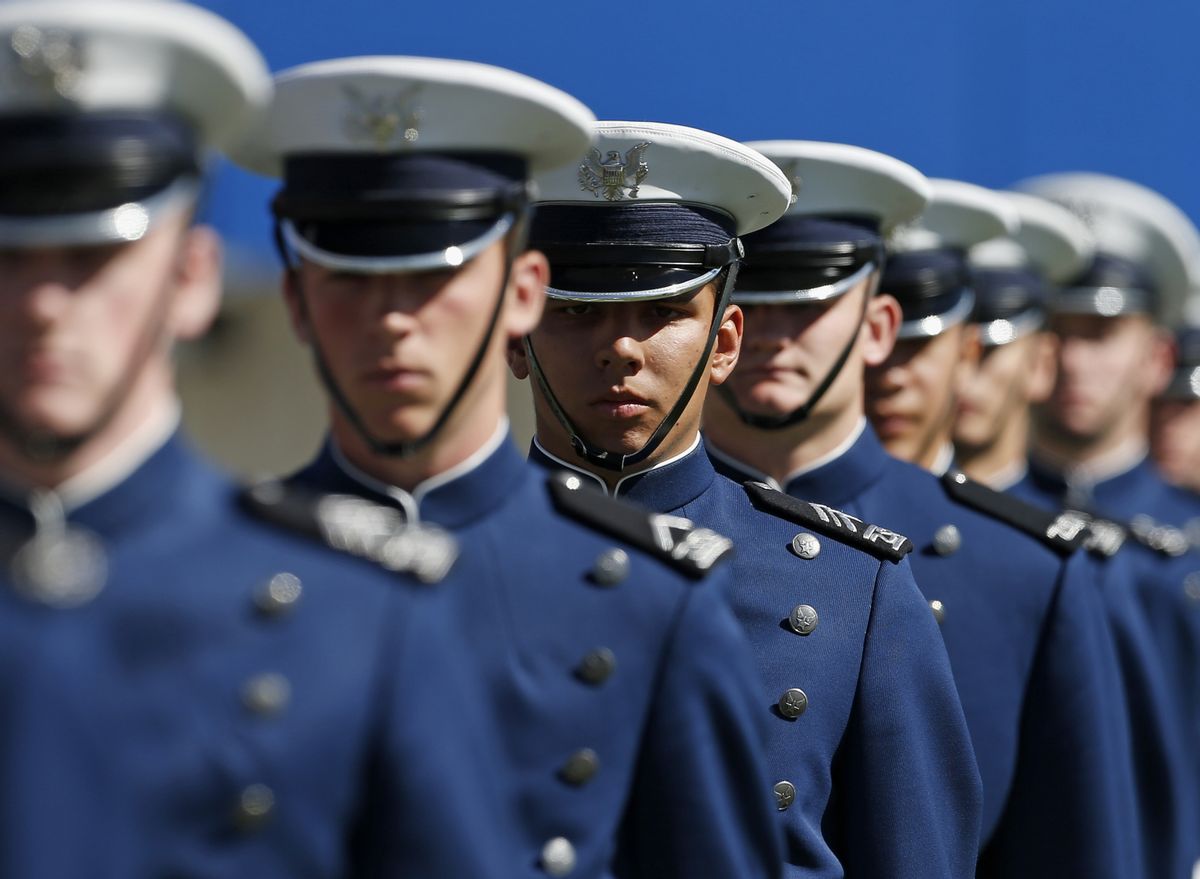A new investigative report on sexual violence and other misconduct at the United States Air Force Academy (AFA) is a wildly disturbing look at campus rape culture at the prestigious military school. Disturbing, but sadly familiar. Cadets on the school's athletic teams are alleged to have sexually assaulted female classmates, and those crimes were largely ignored by coaches and administrators. When cadets were held accountable, the school took no further action to discipline the coaches and other officers who failed to act. The report exposes, as Alan Pyke of ThinkProgress put it, "the intersection of hero culture and rape culture."
Here are just a few of the findings from Colorado Springs Gazette reporter Tom Roeder's piece (emphasis mine):
"'The girls' drink, or Captain Morgan with the blue lid, was only for girls to drink [at one party at the school],' [Office of Special Investigations] confidential informant cadet Eric Thomas told investigators in a written statement obtained by The Gazette. The blue-capped bottle, he explained, was laced with 'roofies,' a street term for flunitrazepam, a powerful sedative known as a date-rape drug."
"After academy leaders were told about the allegations of rape and drug use, OSI agents planned their own party, one with informants in the crowd and special agents nearby to bust bad actors. But leaders determined that the risk that women would be raped was so high that the idea of a January 2012 sting was quashed, academy officials said."
"In the 2012-2013 academic year, cadets reported 45 sexual assaults, representing nearly two-thirds of the 70 reported assaults at all three major military academies."
These things are, of course, outrageous and unacceptable. They are also depressingly common, both at military and non-military schools. But the first thing I thought after reading Roeder's in-depth examination of just how bad things are at AFA was Title IX. Namely, that Title IX -- in all its weak imperfection -- doesn't protect cadets at AFA or any other service academy. Despite being taxpayer-funded institutions, each is exempted from the federal anti-sex discrimination law. Victims of sexual assault at these schools are more or less on their own, even more on their own than students at other universities who are already quite on their own.
Sexual assault at these schools "is something that's being tracked, but doesn't get a lot of attention because the academies fall in this middle ground between an academic environment and a military environment," Service Women's Action Network (SWAN) policy director Greg Jacob told Salon. "But there is no reason the academies shouldn't be included in Title IX. It would bridge the gap between what Congress is trying to do with colleges and what they tried to do with the active duty military."
And as Roeder's report makes clear, AFA officials mostly framed the sexual violence problem on their campus as a matter of a few bad apples who don't meet the school's "strict conduct rules" rather than a systemic lack of accountability that started at the very top. There has been some movement toward reform -- AFA Superintendent Lt. Gen. Michelle Johnson has ordered a review of the athletic department, a few cadets were punished following the OSI investigation and other cadets have started a sexual assault awareness group -- but, as Roeder points out, "While pains were taken to punish the cadets for the conduct, there's little evidence that academy leaders asked wider questions about whether the misconduct of so many athletes exposed deeper problems within the sports programs."
This is the problem with "bad apple" thinking, Jacob said. "How many times do you have to try to point out the bad apples before you realize the whole bushel basket needs to be thrown out? How many bad apples do you have to eat before you cut down the poison tree?"
And failures of accountability at the service academies can have serious consequences throughout the military, since most generals and admirals come from these elite schools. "When you look at the number of four-star generals in the military -- the military academies are unique not only because of the nature of the education, but also the influence their graduates have on these institutions," Jacob noted. "All of the top leaders come from the academies."
The solution is not just self-correction from AFA and other military schools, but for Congress to act to bring them under the umbrella of Title IX, according to Jacob. "This is why we have Title IX," he explained. "We have an atmosphere right now where a student has to be worried about being sexually harassed or assaulted. How are they supposed to learn when they have to look over their shoulder walking to and from class?"
There's real momentum right now to give the federal anti-sex discrimination law some teeth, but if service academies continue to be exempted, survivors at these schools won't be able to share in those gains. "The service academies are the hothouse where you're either going to sprout leaders or predators," Jacob said. "It's a unique challenge, but it's really one that Congress hasn't taken up. They should."

Shares